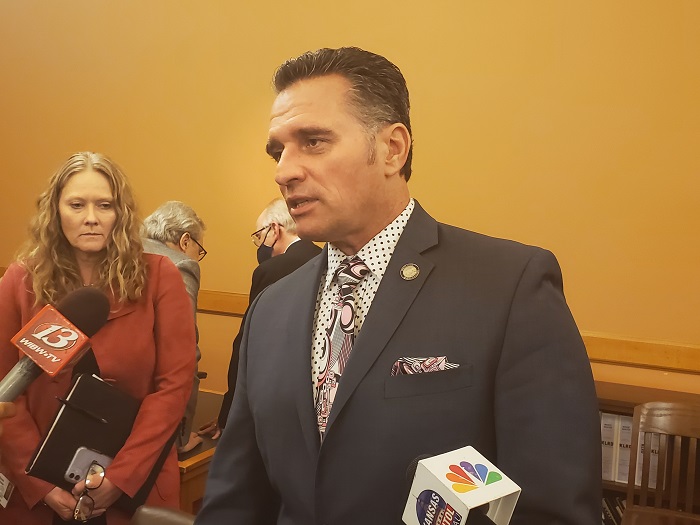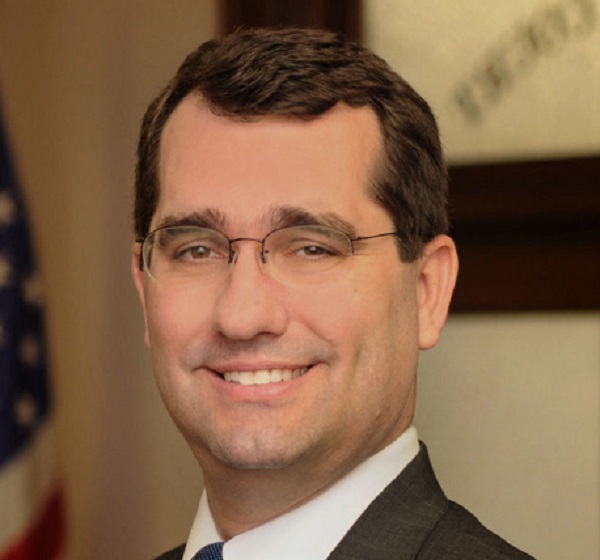(Updated to include reaction from attorney general, Senate president).
Johnson County District Judge David Hauber on Tuesday refused to delay his order declaring the state’s new emergency management law unconstitutional and unenforceable.
Kansas Attorney General Derek Schmidt had asked for a stay of the ruling to allow for an immediate appeal to the Kansas Supreme Court.
Hauber described Schmidt’s request as a “salvage operation,” saying the attorney general only cited “speculative harm.”
A spokesman for the attorney general said the judge’s decision would be immediately appealed to the Kansas Supreme Court.
The ruling fostered more confusion about what law governs the state’s response to any emergency that could confront the state beyond the new spread of COVID-19.
“I am in the process of learning about the impact of the judge’s refusal to stay his decision striking down the entirety of SB 40,” Senate President Ty Masterson said.

“At present, this act of judicial overreach puts Kansas in a state of legal confusion and therefore, I expect and hope it will be appealed quickly,” he said.
Hauber’s ruling struck down the state’s new emergency management law, which gave residents the ability to go to court to challenge health orders issued by the state, local governments and school districts.
The judge’s ruling upended the entire law, which limits the governor’s power to declare an emergency as well as the power of local authorities to implement health orders at a time when the COVID-19 variant is spreading.
“The intent of the law was clear up until this ruling,” House Speaker Ron Ryckman Jr. said in a text message.
“Unfortunately, this is what happens when activist judges have the opportunity to score political points from the bench,” he said.
Senate Minority Leader Dinah Sykes defended the ruling.
“Senate Bill 40 never passed the smell test, and it’s no surprise that Judge Hauber has found it unconstitutional,” Syke said in a statement.
“But rather than taking responsibility for their failed attempt at rendering our executive branch powerless, Republicans are taking shots at the judicial branch, too,” she said.
The ruling potentially undoes lawmakers ability to restrict the governor’s authority to declare an emergency, something they did last month when they refused Gov. Laura Kelly’s request to extend the ongoing COVID-19 emergency past June 15.
The law struck down by the judge prohibited the governor from declaring a new emergency related to COVID-19 this year without the approval of five members of the Legislative Coorrdinating Council, which is made up of leading lawakers.
The bill required county commissioners to approve any order proposed by the county health officer that mandated face masks, limited business operations, restricted the size of religious gatherings or controlled the movement of the population.
Hauber focused on those court challenges in ruling that the law deprived the government of due process while also violating the separation of powers between the judicial and legislative branches.
Schmidt argues that ruling affected seemingly unrelated parts of the law, namely the ability of leading lawmakers on the Legislative Coordinating Council to extend any disaster emergency issued by the governor.
The ruling “has the potential to create all sorts of new and novel legal issues that we believe are, frankly, unnecessary under the circumstances of the case,” Solicitor General Brant Laue argued in a 20-minute hearing Tuesday morning.
“There have been inquiries about what is the status of Kansas emergency management law in the wake of the court’s decision,” Laue said. “What fills the gap to having SB 40 being declared unconstitutional?”
The law gives the governor the power to call a 15-day state of disaster emergency and gives the LCC the power to extend it for multiple periods of 30 days.
The LCC’s authority under the law also extended to disaster emergencies related to domestic animals, plants, raw agricultural commodities, animal feed or processed food.
Given the court’s ruling, Laue asked whether the state would have the power to respond to an outbreak of animal disease in western Kansas.
Laue said it would be expected that the state would revert to prior law although it potentially could be argued there is no law on the books to respond to an emergency.
The previous state law allowed the governor to issue an emergency declaration for 15 days, at which point it could be extended by 30 days by the State Finance Council or the Legislature.
However, there were questions about whether under that law the governor could call for a second extension for the same emergency.
Hauber, however, expressed skepticism about the state’s claims, especially since he gave it opportunities to articulate its position on what parts of the law that could be severed if they were declared unconstitutional.
Hauber said the state had least two chances to the address the question of severability and didn’t before seeking a stay of the court’s ruling.
“I asked you to address that and then you didn’t address it,” Hauber told Laue. “Is there a reason you didn’t address it?”
Laue said he thought the state’s arguments were overwhelmingly in its favor that it didn’t take up the issue of how unconstitutional parts of the law could be severed.
“If the statute was not unconstitutional, there was no need to even think the court should reach the severability issue,” Laue told the judge.
Hauber said the state has a post-trial option of asking the judge to clarify his order. He said the state had 28 days to file a motion seeking a clarification.
Hauber raised the very issue in deciding against the attorney general.
“It is clear the attorney general deliberately avoided addressing the court on two occasions to address the subject of the stay now being sought, over the speculation
that the impact of the Court’s decision might impact issues other than those addressed in the order,” Hauber wrote.
Hauber also remarked about Laue parroting the judge’s phrase of “legal anarchy” in the motion seeking a stay.
“If this court’s order is not stayed, the confusion created by that order will persist and potentially hamper the state’s ability to respond to a future disaster emergency, inviting the very sort of ‘legal anarchy’ that troubled the court,” Laue wrote.
Hauber criticized Laue for throwing the phrase back at him.
“This turn-of-phrase, however, is apparently intended for some other audience but not a court of law,” Hauber wrote.
“It also does not consider the baseline constitutional concerns at stake and that were addressed.
“Any future concerns about the impact of the Court’s order and SB 40, lie with SB 40’s architects, the Legislature, and, ultimately, the Supreme court,” he wrote
The case comes at a time when COVID-19 is making a resurgence as the delta variant is increasingly spreading and leading to new health protocols.
The Shawnee Mission School District argued that it — and other school districts — would be harmed by a delay as they face the potential of responding to the rise in COVID-19 cases as the delta variant of the virus spreads.
The district argued that delaying the order would allow the law – “replete with constitutional violations” – to remain in place and hobble its ability to respond to the spread of the COVID-19 delta variant.
If the number of COVID-19 cases continues to escalate and the delay is granted, a new state of emergency may be declared that could immediately resurrect provisions of that law that the judge ruled unconstitutionally encroached on the judiciary and violated the due process rights of government defendants.
On Monday night, the Shawnee Mission school district decided to require its elementary students to wear masks this fall.
The district’s legal counsel, Rachel England, argued while the state is asking for narrow relief what it’s really seeking is something much broader in a way that would harm the school district with continued unconstitutional violations.
“We think that’s improper and that it would allow for continued constitutional violations and remove the protections of the court’s order,” she said.
In declaring the new law unconstitutional, Hauber homed in on sections that allowed Kansans to challenge health orders in court.
State, local governments and school boards, under the law, were required to hold a hearing on any grievance brought against a health order within 72 hours.
Any civil action brought within 30 days of the hearing must be heard in court within three days, as well.
The law says a judge “shall grant relief” unless the court finds that the order was narrowly tailored to respond to an emergency in the least restrictive way possible.
A judge had seven days to rule. If the court didn’t issue a ruling in seven days, the plaintiff would be granted a judgment in their favor.
The law also provided the same grievance process for orders issued by cities and counties. It also applied to community colleges and executive orders issued by the governor.
The judge found that while the law was developed under the “guise of giving local governments the authority to address specific pandemic issues,” it actually “hobbled” their efforts by enacting legislation that would ensure lawsuits would be filed.
Hauber took particular aim at a provision of the law that declared a judgment in favor of the plaintiff if a decision wasn’t reached in seven days.
“It is difficult to fathom what the drafters of SB 40 used as a legal template for this default provision which seems to be unprecedented in the law,” the judge wrote.
“There may be numerous reasons a judge may not be able to get a decision out in seven days, whether there are more emergent cases, an unforeseen calamity or even the ability to research and issue a reasoned opinion.”













